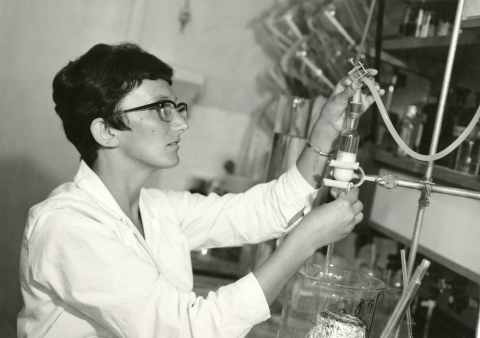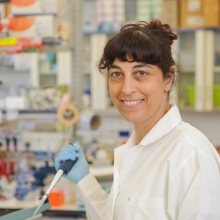Dr. Celia Zwillenberg-Fridman and Dr. Kobi Abramson
From Weizmann scientist to Weizmann donor, the closure of a circle
People behind the science

The roots of Celia Zwillenberg-Fridman’s giving to the Weizmann Institute are literally in the soil.
Born in Argentina to a father who was an agronomist on a Jewish agricultural colony, Celia grew up with an appreciation for science and went on to receive a PhD in biochemistry. She and her siblings were thus part of a small but intriguing piece of Jewish history, having grown up on a Baron de Hirsch colony in rural Argentina, where their father worked as an instructor. The colony was one of several established by that German Jewish philanthropist, who founded the Jewish Colonization Association just prior to turn of the 20th century for the purpose of resettling Jews fleeing persecution in Imperial Russia.
Like other children who grew up in the Baron de Hirsch colonies, they were taught a love for the land and a love of Israel. Two of Celia's siblings made aliya and were co-founders of Kibbutz Gazit in the Galilee, and after Celia completed her PhD at the National University of La Plata (Buenos Aires), she moved to Israel in 1963.
Grapefruits and soybeans
Her first job in Israel was in a hematology lab at Afula Hospital, and her second at the Volcani Institute, the Israeli government’s agricultural research facility, where she researched the composition of grapefruits using a method called chromatography. Then, she got what she called her “dream job,” in the lab of Prof. Nathan Sharon at the Weizmann Institute, in what was then the Department of Biophysics. “In Argentina, as a girl, I read a publication about Israel in which the Weizmann Institute was mentioned, and I decided then that it was my dream to work there,” recalls Dr. Zwillenberg. “I was thrilled when it actually happened.”
In Prof. Sharon’s lab in the Ullman Building, she studied the amino acid composition of soybeans. She published several journal articles with Prof. Sharon and Prof. Ephraim Katzir, who headed the Department of Biophysics (and later became Israel’s fourth President).
“I worked there for six years, and they were unforgettable ones,” she recalls. “Everyone in the lab welcomed me into their families, hosted me at their homes, taught me Hebrew… I am forever grateful for this, and for all the help I received as a new immigrant in Israel. So when I was able to give back, I decided to give to young scientists at the Weizmann Institute.”
It was at the Institute that she met her husband, Lutz, a Swiss scientist who came to the Institute as a visiting scientist, where he studied fish. And thus her time in Israel came to an end: She moved back to Switzerland with him and settled in Bern, where she lives today. She worked in his lab at the University of Bern where he specialized in electron microscopy and later established a private lab. He published a book on the relationship between science and religion, and, together with Celia, organized public lectures on Judaism. The couple had two daughters, Daphna and Tamara. Celia missed Israel, but she threw herself into her work, her family life, and became (and is still) very active in the Swiss Jewish community.
Investing in the next generation
In 2011, the couple established the Dr. Celia Zwillenberg-Fridman and Dr. Lutz Zwillenberg Career Development Chair, with Dr. Kobi Abramson of the Department of Immunology as the first incumbent (pictured with her). Lutz was too ill to travel to Israel for the dedication ceremony, and died later that year. The gift, says Celia, was a way to pay tribute to the Weizmann Institute and at the same time honor the place where she and Lutz first met.
Dr. Abramson, who made aliya from Prague, was a “perfect match,” says Celia, because he was a young immigrant, and because his area of study intrigues her: He studies the molecular and cellular mechanisms that control the establishment of immunological tolerance, a process in which the immune system “learns” to recognize and tolerate the body’s own components.
Last year, Celia made another major gift to the Weizmann Institute, this time for start-up funds for Dr. Yifat Merbl, also of the Department of Immunology. Dr. Merbl’s research explores the many modifications that proteins undergo in the human body. She developed a high-throughput system to monitor post-translational changes in thousands of proteins in parallel, under conditions close to those of the complex cellular environment. These changes are instrumental to the activity of proteins, and revealing the regulatory code that controls altered protein function is key to understanding the dynamic regulation of cells in health and disease.
“Celia is a wonderful woman and a scientist who cares about ensuring that the next generation of Israeli scientists has the tools they need to succeed in their job, and I am incredibly grateful for her support of my chair,” says Dr. Abramson. “It is an honor to hold the chair that she and Lutz created together, here at Weizmann, where they met and started their lives together—as scientists and as husband and wife.”
Dr. Kobi Abramson is funded by Ruth and Samuel David Gameroff Family Foundation, The Richard F. Goodman Yale/Weizmann Exchange Program, Estate of Raymond Lapon, Rising Tide Foundation, Sy Syms Foundation, Wohl Biology Endowment Fund. Dr. Abramson is the incumbent of the Dr. Celia Zwillenberg-Fridman and Dr. Lutz Zwillenberg Career Development Chair.

Dr. Zwillenberg-Fridman as a young scientist in the lab of the late Prof. Nathan sharon








